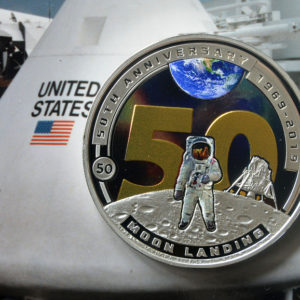Not long after Neil Armstrong set foot on the moon in 1969 leaving his imprint for the ages, author Tom Wolfe asked himself a simple question: “What makes a man willing to sit on top of an enormous Roman candle, such as a Redstone, Atlas, Titan, or Saturn rocket, and wait for someone to light the fuse?”
Wolfe’s answer, his wife told me, came after five long years of research and interviews with America’s first group of astronauts, the “Mercury Seven.” Wolfe reduced their extraordinary abilities to three simple words, which became the title of his 1979 book and remain watchwords for bravery in the American lexicon: “The Right Stuff.”
Despite repeated probing, Wolfe discovered that it was not in the nature of astronauts to deconstruct courage — ironically enough because it wouldn’t be the right stuff. In their world, where split-second decisions were required to avoid catastrophe, reflective thought could be deadly. They were happy to discuss “risk” and “calculated risk” because as fighter and test pilots, many of whom had master’s degrees in engineering, risk was something that was quantifiable.
Not so with analyzing courage, which fell into the uncomfortable domain of psychology. As the 12 remaining lunar explorers told me, they had little use for NASA’s psychological tests that were designed to unearth their “true feelings” and “personality types.”
My hope was that the passage of time had lowered their defenses enough to finally reveal what they consider to be the right stuff and why they were willing to tolerate the weekly fatalities in testing supersonic aircraft. The answers, from these mostly octogenarian men, were not what I was expecting. The real right stuff— the true source of their courage, they argue— revolves around two virtues that would sound alien to modern ears: pursuit of “the common good,” and “believing in something greater than oneself.”
“To find the courage to sit on top of that rocket,” says Apollo 8’s Bill Anders, the first of three humans to have seen Earth from the Moon, “you have to believe not just in the mission, but in Duty, Honor, Country, and the common good.”
“The notion of the common good, finds its roots in ancient Greece. In Aristotle’s ‘Politics’ he said that for democracy to work, citizens need to subsume their private interest to the common good and the notion that we’re not just living for ourselves, but that we live for the community.
“I felt it was my duty to serve America,” said Alan Bean, who was the fourth man to walk on the moon. “If it meant risking my life, I was okay with that since the space program was so important to America and to me. People today need to think more about serving the common good instead of their own selfish needs.”
Bean would go on to accuse today’s elected officials of being “false patriots and self-serving jackasses” for wearing the American flag on their lapels — an honor that should be reserved only for those who’ve gone to war.
The unbridled egotism infecting many of today’s political leaders, the chest-thumping of our sports stars, and America’s obsessive pursuit of celebrity, is precisely the wrong stuff. So is the apparent lack of moral courage in speaking truth to power. When President Nixon insisted on playing “The Star-Spangled Banner” during Armstrong and Aldrin’s moon walk, Apollo 8 commander Frank Borman, who served as NASA’s liaison to the White House, told Nixon: “No, Mr. President, this smacks of American nationalism at a moment meant for all mankind.” Nixon, dropped the national anthem.
As a result of their life-changing view of our small blue water planet from the desolate moon, the astronauts’ commitment to the common good was elevated on a planetary scale. The mantra that provided their building blocks for courage: Duty, Honor, Country, now reads: Duty, Honor, Planet Earth. If there is any lesson to be learned on this 50th anniversary of the moon landing, it should be that humans find the right stuff to pursue the common good of planet earth — instead of the tribalism affecting every level of society. Without such courage Neil Armstrong warned, near the end of his life, “We may or may not have time enough to grow as a species to control our ultimate destiny.”

